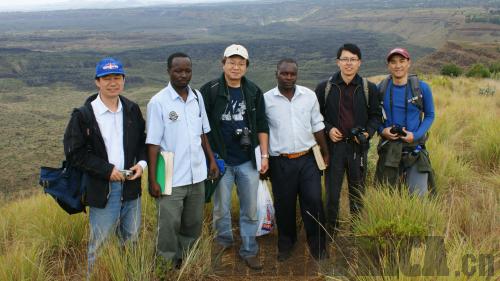|
 |
|
Wang Qingfeng is doing fieldwork with African researchers in Africa |
Opportunity favors the prepared mind
In 2001, Wang arrived in Kenya to investigate the possibility of cooperation in biodiversity research. He even signed a cooperative research agreement with the East African nation's Egerton University. But due to complications and lack of funds, the collaboration did not last long.
In 2002, after three years of studying, Gituru, who was by now Wang's student, graduated from Wuhan University. He returned to Kenya and became a teacher in the Department of Botany at Jomo Kenyatta University of Agriculture and Technology (JKUAT).
Gituru fully understood and supported his mentor's ideas about promoting joint research in biodiversity conservation between China and Africa. He also trusted China's accumulated knowledge on flora. Once back in Kenya, he maintained close contact with Wang, and their joint efforts accelerated the process of cooperation.
Opportunity favors the prepared mind. In 2009, Wang was transferred from Wuhan University to WHBG. With its more advanced experimental and technical support system and more competent research team, WHBG provided him with a better platform to realize his dream.
In August 2009, the cooperation between WHBG and JKUAT was settled. Later that year in December, Wang and his co-workers returned to Kenya and signed the "MOU - JKUAT & WHBG 2009" agreement. In 2010, the two sides formally signed a cooperative research agreement and set up the Directorate of Sino-Africa Biodiversity Resources Conservation at JKUAT. Gituru became the directorate's director.
Now under the Biodiversity Conservation Studies in East African Flora project, both sides since 2011 have conducted four joint investigations in Kenya and other African countries. Their findings on Kenya's common and ornamental plants will be published in a detailed study by the end of 2012 in both English and Chinese. This publication will fill the academic gaps in biodiversity science, and the hope is that it will spark research interest in African countries. Plans to jointly build botanical gardens are also being drafted under the project's framework.
The road ahead
From aiding Africa to promoting China-Africa cooperation, exchanges between Chinese scientists and Africa are being expanded. Wang's ties with the continent are getting stronger.
According to Wang, his project will be completed in three years as scheduled. But even after the project ends, "I will continue my joint research with African researchers," he says. "Doing scientific research is a long process, [and] now that we have started, we should continue working on it. Our efforts will bear fruit later."
He also hopes that more interest in biodiversity conservation can be cultivated on both sides, so that the cooperation can be carried on by the next generation of scientists. This joint work, he believes, will lead to the sound development of Sino-African relations in the long run. |